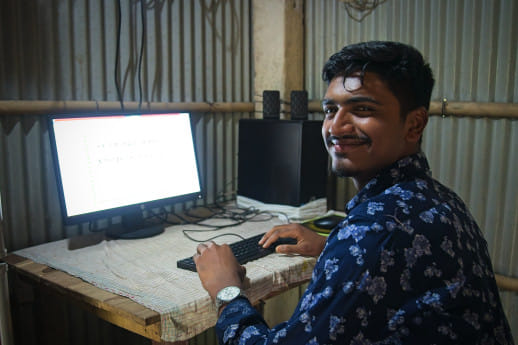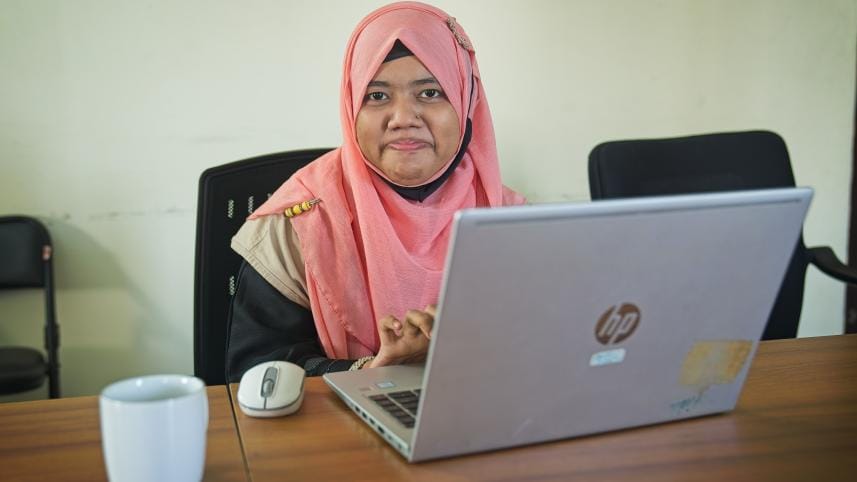Overcoming hardship thru skills development

At just 18 years old, Monir Hossain has become a beacon of hope for the village of Samitipara in Cox's Bazar.
Monir's journey from hardship to success has inspired his community, offering a glimpse of what's possible with determination and opportunity.
Samitipara, one of the poorest villages in Cox's Bazar, is a place where children often grow up amid uncertainty, with even basic needs unmet.
Yet, Monir has defied these odds, transforming his life and inspiring those around him.
With the training and opportunities he received through the Unicef Adolescent Development Programme, funded by the European Union, he changed his life and impacted those around him.
The programme, designed for out-of-school adolescents aged 15 to 18, equips youth in host communities and Rohingya refugee camps with skills. For Monir, this meant learning computer applications and freelancing -- tools that opened doors to international opportunities and self-sufficiency.
"I'm the only one in my village with a computer," Monir shared.
"At first, children came just to see it, curious about what it could do. After my training, I'm working on international freelancing platforms and have a part-time job at a local computer shop. I pay for my education and support my family," he said.
"Many job seekers come to me for assistance. I help them apply online, and they pay me for my service," he said.
Monir's influence extends beyond employment. In a community where early marriage
Monir is common, he's a vocal advocate against the practice.
"Early marriage has long-term negative effects on children and families. I've convinced several parents to delay their daughters' marriages, emphasising the importance of education and stability," he said.
His mother, Aleya Begum, said, "Everyone knows me as 'Monir's mother'. It makes me so proud."
Monir isn't the only one transformed by the programme. Across Cox's Bazar, 5,493 adolescents attend 104 Unicef-established multi-purpose centres, offering education, vocational training, and courses on child protection, nutrition, and climate change awareness.
Each six-month course equips participants with practical skills to improve their lives and contribute meaningfully to their communities.

CHRONICLES OF CHANGE
Eighteen-year-old Tarjina Akter Tasmim is another shining example.
Initially met with obstacles, Tarjina completed her computer training and is now a skilled photo editor, social media manager, and social activist.
"When I started, many questioned my decision. They said women shouldn't do such work. But after my training, the same people began appreciating my efforts," she said.
Today, Tarjina works part-time for an NGO and advocates for women's and children's rights.
Her activism has led to tangible results, such as helping a family file a case against a local boy accused of harming a young girl. "I address issues like stalking, child marriage, and violence against women by working with community elders," she said.
Meanwhile, after completing an MS Office course, Sayef Hanafi Adil, 17, began working part-time in a computer shop, funding his education.
Similarly, Ishrat, who only studied up to class five, used her tailoring training to improve her family's financial situation.
She takes orders from neighbours and runs an online business. She does not have her sewing machine, relying on one at the Unicef training centre.
Their stories are not just individual triumphs -- they are beacons of hope for their communities.
As Monir puts it, "We're not just learning skills; we're building dreams."




 For all latest news, follow The Daily Star's Google News channel.
For all latest news, follow The Daily Star's Google News channel.
Comments